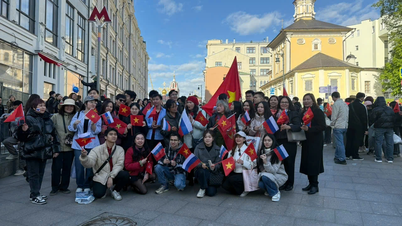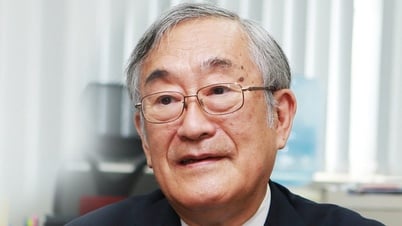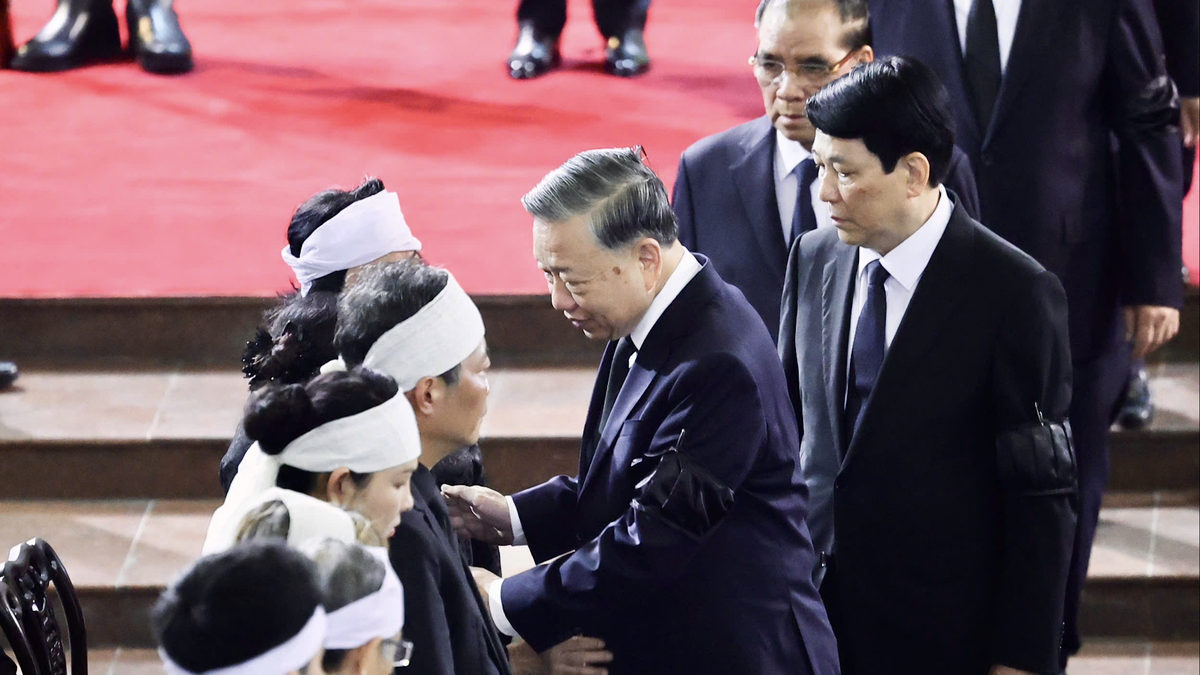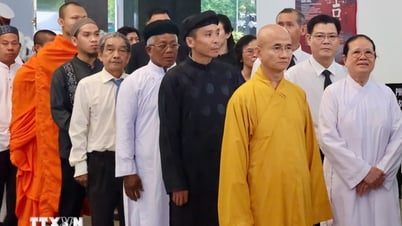Vu Thanh Huy, 29 years old, Senior Machine Learning Engineer at Nvidia, was a student majoring in Mathematics and valedictorian of Ho Chi Minh City University of Natural Sciences .
It is a provider of artificial intelligence hardware and software and a manufacturer of graphics processing units (GPUs). Generative AI tools like ChatGPT are built on large language models running on Nvidia GPUs.
Huy's main job is to optimize popular large language models such as GPT, Bert, T5, LLaMa. Since these models need to run on multiple GPUs at the same time, Huy has to arrange the components of the language model so that the algorithm runs in parallel efficiently, helping to process more data and save more money when used in enterprises.
“I’ve come a long way to work in Silicon Valley. It’s worth it,” Huy said. As of December 2023, Nvidia is one of six companies in the US with a market capitalization of more than $1 trillion.

Vu Thanh Huy. Photo: Character provided
Huy is a former student specializing in Mathematics at the Gifted High School in Ho Chi Minh City. In 2012, Huy was admitted as the valedictorian of Block A at the University of Natural Sciences, Ho Chi Minh City National University, and chose to pursue Mathematics and Information Technology. Realizing that information technology was on the rise, Huy chose Computer Science as his major and began to dream of studying abroad.
Despite his intense pursuit of numbers, Huy’s passion for art is equally strong. Huy joined the school’s performing arts team and was a member of the hip-hop dance group The Lyricist. During the peak exam season, Huy studied during the day, practiced in the evenings, and studied and reviewed for exams at night. He was the valedictorian of the 2017 mid-year graduation class with an average score of 9.27/10.
Huy thought it would be interesting to combine a humanities major with machine learning research instead of the usual programming and algorithm work. He determined that his major would be Natural Language Processing and Applications in Psychology and Social Sciences.
"I have always believed that the more different scientific fields intersect, the more novel and interesting the discoveries will be," Huy wrote on his website.
In 2018, Huy enrolled in a PhD program under the guidance of a renowned professor in the field of Applied Machine Learning in Psychology at Stony Brook University, USA. The professor's lab researches problems in machine learning models that can predict the mood or mental health of social media users based on their language.
During his first semester, Huy was overwhelmed by the intense work load of Americans. While studying and working as a teaching assistant, he always felt like he didn’t have enough time. But Huy didn’t allow himself to be discouraged.
"Looking around, everyone has to work like me. If everyone can do it, there's no reason why I can't," Huy shared. Gradually, Huy adjusted his schedule to catch up with the pace of work in the new environment. In his free time, he went to dance classes in New York, choreographed his own dances, or did graphic design to balance and satisfy his passion.
"If programming is at one extreme of thinking and reason, then dancing and drawing are at a very different extreme. Doing both at the same time makes my life more interesting and spiritually fulfilling," Huy said.
Huy dances to the music Beggin you dance. Video : Character provided
Entering the intensive research phase, Huy had to build a generative model that could simulate human language with many different psychological traits, personalities, or mental health conditions. His goal was to help scientists have a new perspective to understand human psychology, as well as build more human-like conversational robots.
Like many graduate students, Huy had his moments of frustration when trying to find a new method for his project. It took him a year of testing different procedures before he finally came up with a final result.
However, Huy is satisfied because he has spent time on a field that he is very interested in.
In addition to research, to find formal employment opportunities, Huy applied for internships at technology corporations, in charge of researching and solving problems related to machine learning. For example, at Meta and Amazon, Huy's main job was to increase the accuracy of speech-to-text algorithms.
Huy's work results were rated at EE - Exceeding Expectations by his manager at Meta. According to Phan Thanh Hai, a PhD graduate from Auburn University, Huy's former colleague at Meta, this is not easy in an environment with more than 1,000 interns from all over the world .
"Huy is a capable, efficient and proactive colleague. Huy skillfully solved the AI problems posed by the team quickly and with a plan," Hai added.
In addition, Huy also passed two rounds of interviews to get an internship at Nvidia. In which, round 1 required candidates to do basic programming, round 2 tested them on their basic knowledge and work experience in machine learning, as well as how to solve real-world problems.
Thanks to his demonstrated ability, Huy officially became a Senior Machine Learning Engineer here in July, after receiving his PhD.
According to Huy, the biggest challenge when working at Nvidia comes from the "build everything at the speed of light" working style. Although they are the world's leading graphics chip company, they still maintain the spirit of a startup company to ensure they are always at the forefront. Therefore, the workload of an engineer here is quite heavy, often lasting more than 8 hours/day. Employees must utilize all resources to achieve the expected results.
Working with the latest technologies gives Huy the opportunity to constantly update his knowledge. Because the staff size is not as large as Google or Meta, Huy is able to witness the results of strategic decisions to the company more directly. Thanks to that, in addition to his main expertise, he has accumulated more knowledge about business strategy.
But the most valuable thing to Huy is that the results of his work have a direct impact on the people who use the products, from individual customers to schools and businesses.
"I feel that what I do is meaningful and contributes to the community," Huy said. In addition, Huy collaborated with a professor at Stanford University to build a chatbot that simulates a human therapist and conducts cognitive behavioral therapy.
Huy believes that to have the opportunity to work at a large technology corporation, the simple but very important thing is to spend a lot of time on what you want to do.
"Being serious and dedicated will help you find the right path for you - it could be studying on Coursera, learning from professors or participating in AI training programs of large corporations," Huy suggested.
Huy will continue to work, learn more about the business models of large companies and maintain projects on applying artificial intelligence in psychology in the future.
"I will keep an eye out for opportunities, especially those that lie at the intersection of my strengths," Huy said.
Khanh Linh
Source link







![[Photo] Party and State leaders visit former President Tran Duc Luong](https://vphoto.vietnam.vn/thumb/1200x675/vietnam/resource/IMAGE/2025/5/24/960db9b19102400e8df68d5a6caadcf6)































![[Photo] Anh Hoang - Dinh Duc successfully defended the men's doubles championship of the National Table Tennis Championship of Nhan Dan Newspaper](https://vphoto.vietnam.vn/thumb/1200x675/vietnam/resource/IMAGE/2025/5/23/d6ab3bcac02c49928b38c729d795cac6)

































































Comment (0)